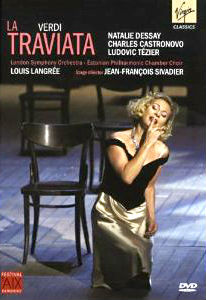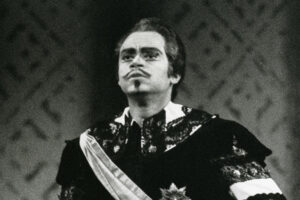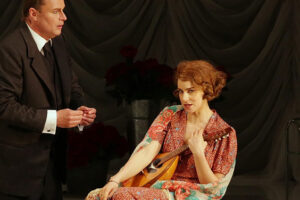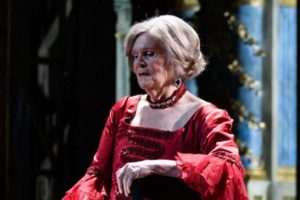
This year, I attended one of Natalie Dessay‘s only fully-sung Traviatas at the Met. Here were my thoughts about the performance. It was, in short, a heartbreaking performance for all the wrong reasons. Dessay displayed everything a great Violetta should have except an actual voice. I was disheartened, then I saw on Amazon that another performance of Dessay’s Traviata was released on DVD
. Intrigued, I made the purchase.
The performance took place at the Aix-en-Provence festival in June 2011. The production by Jean-François Sivadier is a modern-dress one which, unlike the productions by Willy Decker or Robert Carsen, lacks what any production in any era, Regie or not, needs: basic clarity. The story of La Traviata is so well-known and straightforward that perhaps directors have a little more leeway in that most of the audience is likely to be familiar with the opera already, but there were times I was watching the DVD and wondered just what the hell was supposed to be happening onstage.
It seems to take place in a seedy 1950s cabaret theatre, with Dessay and the staff getting ready for “showtime” during the prelude. But I honestly don’t know. A blue curtain and some bar chairs serves as the basic scenery. Natalie Dessay is dressed in an unflattering poofy blond wig, some glittery eye makeup, and 1950’s style cocktail gown until the final act, when she rips off the wig and presumably, the showgirl artifice. In the second act, the blue curtain is replaced by some painted flats of clouds and trees. By Flora’s party I frankly had no idea where and why the characters were where they were. I hate to make accusations but this looks like one of those productions where the director just didn’t care much about the final product.
The most complete performance came, surprisingly, from Charles Castronovo in the often thankless and unsympathetic role of Alfredo. In this production, Alfredo is presented as the real innocent in Violetta’s seedy world. In the first act he is dressed in virginal white. His feelings for Violetta are played straight — he is truly in love with her. Even the ugly confrontation scene in which Alfredo throws money at Violetta ends with Alfredo immediately remorseful. This conception of the character would be worthless without an Alfredo who could actually project such innocence and feeling. But Castronovo’s lyric tenor is sweet and ingratiating, his stage manner even more so.
At the opposite end is a young-looking, totally emotionally blank Ludovic Tezier, who seems to have no idea which opera he wandered into. He has a very pleasing lyric baritone, but he has none of the character’s prudishness, his provincial priggishness, and his essential heartlessness. He just seems like a pleasant guy singing some pleasant music. It’s so very, very wrong.
Dessay’s performance of Violetta will be controversial. I think most opera lovers expect a more full-bodied soprano singing this role. Dessay’s voice at its peak was very forward and metallic, and that edge allowed her to sing roles in large opera houses — her voice wasn’t large, but it projected extremely well. It seemed to echo till it buzzed in your ear, as if she were singing 5 feet away from you.
The years, and some well-known vocal crises (Dessay twice developed nodes and needed surgery to remove them) have left the basic voice even thinner, except now instead of the sharp, metallic edge, there’s just an edge that sounds sometimes like, well, a squeak. Her top notes have deteriorated — what was once secure and blazing now sounds weak and thin. She takes the E-flat at the end of “Sempre libera” but one really wishes she hadn’t tried. But the part of her voice that has suffered the most is the lower-middle register — there’s just no body left to it. It sounds weak, quavery, at times almost borders on a wobble.
The DVD medium, with its preference for closeups, does the soprano no favors — you can see the effort and indeed, what seems like actual pain when she sings in merciless detail.
Then why watch her? Well, for one, Dessay remains a compelling stage actress. She has a great stage face — the large saucer eyes, the heart-shaped face, were made for the stage. Along with the face, she has a style of acting that I know some consider over-the-top (one particular irritating habit she has: standing facing the audience, legs slightly crouched, fists pumped, as if to say, “It’s showtime!”), but at other times can shock you with how right it is.
One moment is the confrontation with Alfredo that closes Flora’s party at Act Two. Dessay looks almost ridiculous with her Phil Spector-like wig, but her body language is pitch-perfect — she conveys the character’s shame, horror, helplessness. It’s not just her acting though. This DVD finds her in a limited vocal estate, but considerably better than her HD performance at the Met, and it’s intriguing what she’s still able to do with the role. She’s a naturally musical singer, with a Callas-like instinct for the right moment to underline a musical phrase for dramatic effect.
For instance, when her weak voice suddenly blazes angrily during her duet with Germont on “Ah no! Giammai!” Or the way she lets all color drain out of her voice during “Dite alla giovine,” as the character gives up in one second both on love and life. In “Alfredo, Alfredo,” she starts with a mere wisp of a voice, almost a whisper, and gets her voice to crescendo throughout the concertato, as she moves from the fetal position to a more dignified upright position.
Another extremely fine moment is “Prendi, quest’e l’immagine.” Dessay momentarily pulls her voice together for some very full-bodied singing before expiring. This instinct for underlining the right moments, in my opinion, separates the great artists from the great singers. For instance, I remember Renée Fleming, lush-voiced and with notes secure throughout her range, singing Violetta with absolutely no idea which moments were important. Every scene was sung with the same lugubrious pleasantry. Dessay with practically no voice is still able to give more insight into the role than, say, the vocally much more secure Fleming. Her diction remains a joy — pointed and precise, with the words well-articulated.
Despite these considerable virtues, Dessay at this point simply doesn’t really have the voice to the role justice. I’m not one of those opera fans who drool over Callas’s late Traviatas. I find them artistically compelling, but I prefer the earlier ones when her voice matched her artistry. I think Dessay simply came to the role too late. There are plenty of moments for Dessay enthusiasts to enjoy, but I wouldn’t recommend this as an introductory La Traviata video. There are stronger productions with stronger singers. But at the same time, Dessay’s insight into the role, and Castronovo’s fine performance, make this a video most hard-core opera fans will want anyway.

























Comments